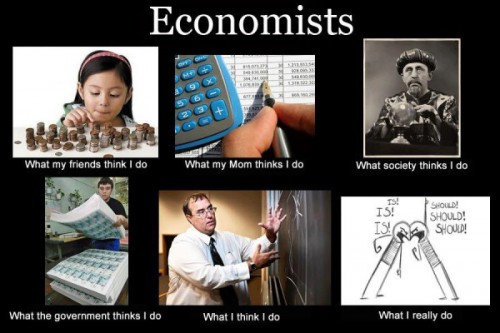
The New York Times dropped a fairly juicy opinion a while back from economist Justin Wolfers about the rise of economists in culture analysis and policy making. It does seem like economists are increasing in social prominence, and as Wolfers mentions, they’re ascending at a quicker pace than the rest of the social sciences. At least, that’s what the anecdotal evidence indicates (that evidence being a study of word counts in archived New York Times past editions). It’s more than just conversations about money, suggests Wolfers–it’s a trend that’s been growing as national economies have become global and more intertwined:
It wasn’t always this way. Historians held the largest market share until the Great Depression intervened in the 1930s, leading a frightened public to take a greater interest in economics.
There’s an old Bob Dylan song that goes “there’s no success like failure,” and it’s a lesson that’s been central to the rise of the economics profession. Each economic calamity since the Great Depression — stagflation in the 1970s, the double-dip recession in the late 1970s and early 1980s, the 1991 downturn — has served to comprar elongate the stock of economists. The long Clinton boom that pushed unemployment down to 3.8 percent was good news for nearly all Americans, except economists, who saw their prominence plummet. Fortunately, the last financial crisis fixed that.
In other words, when gas is at $4.00 a gallon, jobs are scarce, and businesses are failing, quick! call an economist. The piece ends with a passage I found particularly unique in my reading of economists–a marked acknowledgement of humility in the profession’s ability to diagnose:
Economists might instead look to the forces of supply and demand to understand their relative popularity. But it is not due to supply. As data from the Census Bureau suggests, while about 1.5 million Americans are economics majors, there is a far greater supply of psychology majors and history majors and only slightly fewer sociology majors.
This economist is drawn to conclude that if our relative success is not due to supply, then it must be demand, which means that our popularity reflects the discerning tastes of our audience in the marketplace of ideas.

It’s endearing that an economist, devoted to applying the laws of supply and demand, would explain his own popularity by those same laws. That key question Wolfers invites, “why are economists in such high demand,” seems to invite answers from folks outside of the economic disciple. So what might a Christian suggest about the human condition that would drive up the demand for an economist’s input? Two thoughts:
First, the rise of the economist could be a result of a cultural trend toward measurements and metrics. DZ profiled this trend well last May off of another NYT opinion piece, in which Bruce Feiler suggesed that there’s a powerful element (illusion?) of control that can be attained (attempted?) when life is quantified into data and analyzed. Raise your hand if you’re wearing a FitBit. Raise your foot if you’re wearing a pedometer. This is part of the premise behind the successful Freakonomics book and radio series, that economic principles previously used for national policy decisions have something to say about our daily lives as well.
In a more individual case, this metrics trend has also given rise to the Quantified Self movement, which we also profiled a while back. While Freakonomics is an entertaining look at how market forces affect us in ways we don’t expect (i.e. the problems associated with free parking or the strategies of an NPR pledge drive), the Quantified Self movement leans heavily toward self-improvement. Measuring daily physical activity, like calorie intake, heart rate, sleep effectiveness, becomes the first step in identifying how one can/should improve his or her health or spirit. Ethan Richardson also shared in The Mockingbird how the metrics phenomenon has joined conversations in education policy, particularly the world of Teach for America. Creating measurements to track academic performance could help keep students and teachers accountable throughout the education process, although Ethan’s experience with these tools shows they might not measure up as well as we’d hope them to.
There’s a religious hesitation about the rise of the economist that has less to do with economists themselves than what non-economists do with their data. The human condition is such that opposition to the idea “more data = more control = better people” isn’t unreasonable. This opposition makes more sense for a religion rooted in the idea that the knowledge of good doesn’t correlate to (or cause) good (see Romans 7, etc.). The world of data might give us more creative and nuanced little-l-laws, but they might not be so helpful if laws in general haven’t solved our problems.
Wolfers also notes the correlation between economists in the media and economic woe. You don’t have to be religious to watch people wrestle with life’s hardships, addictions, and failure. Having problems is universal, and looking for answers is universal, and as data becomes available en masse about our lives and the results of our choices, of course people will flock to new data to find a solution. Because economists are fundamentally tied to their data, theirs is bound to be a profession whose tide rises with the popularity of self-measuring salvation.
Second, on the more affirmative note, the rise of economists could be linked to their honesty about the human condition. Economists, for the most part, live in the world of money, property, bank accounts, wealth, and the emotions those things engender. Which is to say, there’s no room in the economist play-book for rose-tinted glasses that ignore the aforementioned human condition. Underestimating humankind’s ability to sin or self-sabotage in the economists world means empty bank accounts.
Just ask Alan Greenspan in 2008, who famously said in light of our recent recession: “I made a mistake in presuming that the self-interests of organisations, specifically banks and others, were such that they were best capable of protecting their own shareholders and their equity in the firms.” That’s economist speak for “I trusted people to do the right thing in the interest of their own self-preservation, and I was wrong.”
I mean, Genesis 3, eat your heart out, right?! “What the Heart Loves, the Will Chooses, and the Mind Justifies,” that biblical, sociologist approved description of human decision making faculties, has to be the buckle of the economist’s tool belt. Models and predictions have to be rooted in reality, and as long as reality involves what Martin Luther called the ‘incurvatus in se’ and what social scientists might call ‘a predisposition toward the self,’ religious notions of sin have to be part of the economist’s equation.
This honesty about the human condition is, in my opinion, refreshing. Economists can uniquely cut through layers of posturing and self-justification to build theories based upon human sinfulness. As one economist delicately put it, the profession “takes the pie out of the sky and puts it back where it belongs: on the table.”
There’s a ton more to be said about the rise of the economist, so don’t mistake this conversation as endorsement or skepticism of the trend. In fact, the New York Times continued the conversation with a very thoughtful panel of debaters who are raising these same questions. With some studies suggesting economists wrestle confirmation bias toward their moral narratives, and other studies suggesting the profession has significant issues with sexism, economists make flawed high-priests for congregants of the religion of data. But then again, as many of the clergy who write and read here would attest, all priests are flawed. The Devil was never in the data, so to speak, but the jury is still out whether there’s salvation in the data too.

COMMENTS
Leave a Reply














